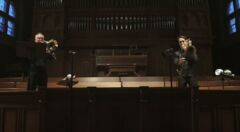
artistic research: Keren from Iannis Xenakis
Like a good deal of compositions by Xenakis, Keren presents the performer with many impossibilities: ...
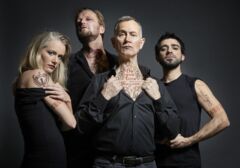
Do you love Wagner? on tour again!
With a strong kick-off in Leverkusen last September and with a new dynamic combination of quartet friends – Karolina Öhman, Stefan Preyer, and João Carlos Pacheco – ...
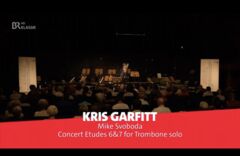
Concert Etudes 6 & 7 premiered
It is a rare moment for a composer to hear a new solo piece played 7 times by 7 different players in one concert, but that was my treat ...
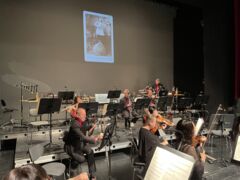
"Once around the world" wraps up residency in Neubrandenburg
Yesterday’s performance of Once around the World topped off my artist-in-residence season with the Neubrandenburg Philharmonie. ...
Read more … "Once around the world" wraps up residency in Neubrandenburg
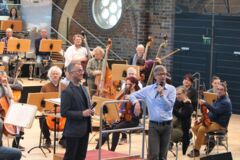
new orchestral opener "Play" premiered
On May 6th, 2022 Sebastian Tewinkel and Neubrandenburg Philharmonie gave my 10-minute orchestra composition Play a lively and energetic German premiere.
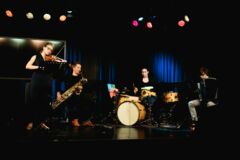
Violine Concerto and Snare Drum Concerto premiered in Berlin
Yesterday in Berlin: The premiere of two new works for the oh-so-talented and oh-so-dedicated oh-so-exciting Concept Store Quartet. ...
Read more … Violine Concerto and Snare Drum Concerto premiered in Berlin
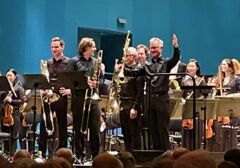
"Far from home" for four trombones and orchestra premiered
Feeling a bit blurry like this picture and in the gentle grip of mild postpartum depression after the premiere of Far from home two days ago, ...
Read more … "Far from home" for four trombones and orchestra premiered

chamber opera "Die Katze" premiered in Linz
In spite of all the Corona turmoil, our new chamber opera Die Katze, die ihre eigenen Wege ging (The cat who walked by herself) did finally have its premiere
New composition: echo yes no (2019) for two harps and live electronics
Generally speaking, I tend to emphasize the positive in life with my music, and thus lightness and humor are not foreign to me. However, for no apparent reason, echo yes no (2019) for two harps and live electronics, as with my Piangerò la sorte mia (2018) for mezzo soprano and ensemble, originates from a darker place—"Worry, don’t be happy".
Read more … New composition: echo yes no (2019) for two harps and live electronics
New composition: Homo Ludens (2019) for two teams of musicians
The process pieces by Karlheinz Stockhausen, such as Plus-Minus (1963), Prozession (1967), or Spiral, (1968) transfer to the performers an unusually large amount of responsibility regarding the sound material and its transformations. In this context, one could say that the performers are co-composers, or at the least arrangers, since they determine to a great extent not only the content, but also the form of the composition. Generally, the transformation of the material is notated using “plus” and “minus” signs indicating an increase or decrease of certain parameters of the sound in relation to the previous one.
Read more … New composition: Homo Ludens (2019) for two teams of musicians
New work for voice and ensemble Piangeró la sorte mia
Last summer was the time to sit down and write some sad music. My composition for mezzo-soprano and six instruments, Piangeró la sorte mia, like the aria of the same name for Cleopatra in Giulio Cesare in Egitto (1723) by Georg Friedrich Handel, is based on a text from Nicola Francesco Hamm. Direct and unpretentious, the music is intended to be a vehicle for the singer‘s expression and virtuosity, as the tradition is. Without quoting a note of his music, I follow the ductus and form of Handel‘s aria: A-B-A‘, slow-fast-slow. If some listeners hear a bit of Handel while listening to my Piangeró, that would be an unintended but acceptable additive, and certainly better than thinking of their tax return or if the babysitter is doing the dishes. Written for the singer Anne-May Krüger and the Basel ensemble neuVerband, Piangeró la sorte mia is dedicated to persons who find themselves in a „worry-don‘t-be-happy“ moment in their lives. I would like to say to them, go ahead and cry, wail, be full of despair (part A). Sooner or later there will be a sliver of hope, even if it is in the disguise of revenge (part B). And if you still feel the urge to worry and whine, then have a second portion (part A’).
video: https://www.youtube.com/watch?v=x6BUI_OaTOQ
Piangerò la sorte mia,
sì crudele e tanto ria,
finché vita in petto avrò.
Ma poi morta, d'ogn'intorno
il tiranno e notte e giorno
fatta spettro agiterò.
I will lament my destiny,
so cruel and so unfortunate,
as long as my heart beats.
But when I am dead,
from all sides my ghost will haunt
the tyrant both night and day.
(translation Anna Maria Pherson)
Read more … New work for voice and ensemble Piangeró la sorte mia
new brass quintet "Open Circle" premiered in Stockholm with Stockholm Chamber Brass
In celebration of their 30-year ensemble anniversary, the Swedish brass quintet Stockholm Chamber Brass asked me to write a work for them. They gave me no limitations, no stipulations, and didn't seem to have any expectations of the composition other than that it be worth the effort they would put into performing it. I was honored by the proposition, and it was quickly evident to me that my composition for such a jubilee could go either of two ways: I could write a party piece, something fun, short, and sweet, or I could write something intricate and challenging, a musical endeavor that taps into their tremendous chamber music artistry. Out of respect for the idealism, stamina, optimism, and enthusiasm each member must channel to an ensemble, I decided to write a demanding piece of 20-some minutes. The decision was easy. Figuring out what to call the piece was not. Before the title Open Circle crystallized, I thought to call it What it takes, because this group obviously has what it takes to keep the ensemble ideal alive for 30 years. Then I thought to call it !, because in a performance, a brass player needs to be an exclamation point and not a question mark – a geeky insider theme that the trombonist of the quintet, Jonas Bylund, and I spoke about in the summer when I was composing the piece. The composition, however, is a sort of portrait of Stockholm Chamber Brass, and at the same time a depiction of the roles that the musicians play within the ensemble. Punctuated with ensemble passages, each player takes the stage for a solo, supported by the rest of the group. Uncharacteristically for me, but out of personal affinity for ensemble, I have given many of these soli and interludes descriptive captions such as "decisive, yet flexible“, "... with patience..." , "brilliant, but modest“, "warm, but mighty", or "impassioned, yet reasonable". Being a brass player myself, I could almost feel the player producing the sounds I was writing down. Furthermore, I found myself inside the ensemble and could reflect about what it means to communicate in a chamber music setting. The musicians huddle together, they discuss, they empathize, they compromise, they get „on the same page“ – all this mostly through non-verbal means. A well-functioning chamber music group can be a small version of a social idyll, self-contained and balanced, like a circle. Yet the musicians do all of this, not for themselves, of course, but for the audience, opening the circle to include you, the listener; therefore the title, Open Circle.
recording: https://soundcloud.com/mikesvoboda/svoboda_open-circle-20181007
Read more … new brass quintet "Open Circle" premiered in Stockholm with Stockholm Chamber Brass
The Techniques of Trombone Playing awarded best edition 2018
The "Techniques of Trombone Playing" published in 2017 in the Bärenreiter series was award the Best Edition Prize from the German Musikedition society.
Read more … The Techniques of Trombone Playing awarded best edition 2018
Wittgenstein & Twombly – Concerto for Saxophone (2017) version for Saxophone and Concert Band
Having grown up playing in concert bands, I am still thrilled by the massive sound this gathering of winds, brasses, and percussion offers. Having rewrite my Love Hurts a few years back and appreciated more rhythmic precision of the concert band compared to orchestra, I was happy for the opportunity to rewrite this concerto for saxophone, recently premiered by Marcus Weiss with the Basel Sinfonietta. The premiere performance of the version with concert band took place on July 15th, 2018 in Toledo, at the Festival Internacional de Música La Mancha with the Festival Concert Band, Sebastián Heras, conductor, and the soloist Pedro Pablo Cámara. A bootleg recording of the performance can be heard here: https://soundcloud.com/mikesvoboda/wittgenstein-twombly-for-saxophone-and-concert-band
More information: https://mikesvoboda.net/compositions-all/articles/wittgenstein-twombly-version-for-concert-band.html
Wittgenstein & Twombly - saxophone concerto world premiere
Marcus Weiss has been a colleague and friend for many years, one that I have upmost respect for his musical intergrety, intelligence and virtuosity. It was a challange to write a concerto for him, one that woudl showcase his abilities and at the same time, with a portion of irony, give him a concerto that places him in a unusual position within the genre itself. Marcus premiered the work last January 28th in Basel with the Basel Sinfonietta under the direction of Baldur Brönnimann and played it a week later at the ECLAT festival in Stutgart with the SWR Sinfonieorchester. The work was commissioned by the Musik-Akademie Basel and the SWR Sinfonieorchester. A video recording of the premiere can be viewed here.
Read more … Wittgenstein & Twombly - saxophone concerto world premiere
On Tour again with "Do you love Wagner"?
The Techniques of Trombone Playing
Mixed Feelings by Kurt Schwertsik
Mike Svoboda will be playing Mixed Feelings (2001) together with the Staatsorchester Stuttgart the German premiere of a concerto for trombone and orchestra, written by Kurt Schwertsik (*1934) at the New Years Concert of the Stuttgarter Oper. Dennis Russel Davis will conduct and there will also be a waltz of Richard Strauss, an ouverture of Hans Werner Henze and a sinfonia of Joseph Haydn. So you can expect a rapturous farewell into this new years’s evening.
Concert for trombone by Georg Friedrich Haas
On 16.10.2016 Mike Svoboda will premiere a concert for trombone by the composer Georg Friedrich Haas together with the SWR Sinfonieorchester, conducted by Alejo Pérez. This trombone concert was a collaborative mission of the SWR, the Sinfonieorchester Basel, the ORF-Radio Symphonieorchester Wien and funded by the Ernst von Siemens Musik Stiftung.
Mike Svoboda will play this composition of Georg Friedrich Haas at the Wien Modern together with the ORF-Radio Symphonieorchester Wien at the end of 2016 and together with the Sinfonieorchester Basel in June 2018.
Svoboda composer-in-residence
With three concerts of Mike Svoboda compositions, the composer was featured at the Festival Zeitgenossen (contemporaries) in the city of Heidenheim, Germany from the 24th to 26th of June, 2015. Alongside a solo performance by Mike Svoboda, there was the German premiere of his Die Bücher der Zeiten, an hour long work for three female voices, trombone and percussion, performed by the Mike Svoboda Ensemble. The third concert was a portrait with the Ensemble AUDITE NOVA under the direction of Maddelena Ernst. Among other compositions it included the German premiere of the quintet Eunoia and 20 French Songs.
New concerto from Georg Friedrich Haas
Mike Svoboda will premiere a new work from the Austrian composer Georg Friedrich Haas at the Donaueschinger Musiktage 2016 in Donaueschingen, Germany. Further performances are planed for Vienna and Basel. The work is still to be composed, but the first step has been taken: a date, venue and commission for the premiere!
New Duo from Beat Furrer
Together with the soprano Golda Schultz, Mike Svoboda premiered a new work by the Swiss composer Beat Furrer at the Festival Dialoge in Salzburg in November 2015. It was part of a recital that the singer Golda Schultz gave on the 28th of November at the Mozarteum in Salzburg.
new composition: Triple Concerto
In December of 2013 Mike Svoboda was commissioned by the Sieghardt Rometsch Foundation to compose a work featuring the three winners of the 2013 Aeolus Competition, Tom Poulson, trumpet, Sebastiaan Kemner, trombone, and Rubén Durá de Lamo, tuba. This work, written in the summer of 2014 and called simply Triple Concerto, will be given its premiere performance on the 17th of April in Cottbus, Germany, with the mentioned soloist and the Philharmonisches Orchester Cottbus under the direction of their conductor Evan Christ, with a following performance on the 10th of April. http://www.staatstheater-cottbus.de/programm/konzerte/artikel_7-philharmonisches-konzert-2015.html
New Publisher: Boosey & Hawkes
In January 2014, Mike Svoboda signed some 20 past works and all new works exclusively with publisher Boosey & Hawkes. Besides the orchestra works and works for the stage, some of the most recent compositions such as Luminous Flux (2014) for 8 voices and percussion, Eunoia (2014) for female voice, trombone, violoncello, piano, and percussion are now available for hire and sale. Music for Trombone, Piano and Percussion (2011) as well as Music for Trombone and Ensemble (2012) will be available at the end of April.
Mike Svoboda at Boosey & Hawkes: http://www.boosey.com/pages/cr/composer/composer_main.asp?site-lang=en&composerid=100116
Eunoia on YouTube: https://www.youtube.com/watch?v=Pi8EddpHgIU
Luminous Flux on SoundCloud: https://soundcloud.com/mikesvoboda/mike-svoboda-luminous-flux-for-8-voices-and-percussion
Les Trombones du Bâle concerts in May
On May 29th in Mannheim, Germany and on the 30th in Basel, Switzerland, Mike Svoboda’s trombone ensemble les trombones de bâle was playing two concerts entitled „we are monkeys with money and guns“. With works for 1 to 8 trombones written by the American composers John Cage, Sidney Corbett, David Rosenboom, Tom Johnson, Aaron Cassidy, Mike Svoboda, and Robert Erickson, the program covered a range of music over the past 50 years. The ensemble consisted of present and former students of Mike Svoboda, as well as a few special guests. The 29th of May is in Mannheim, Germany and the 30th of May in Basel, Switzerland. Further Information: https://www.facebook.com/lestrombonesdubale
Workshop/competition new music theater for young audiences
The Stuttgart organization IndieOper e.V. was offering an exciting workshop/competition for new works of music theater for young audiences. In two workshops in May and October 2015, young composers were coached by a team – Manfred Weiß, stage direction, Sarah Sun, voice, Mike Svoboda, composition, Johannes Fuchs, dramaturgy on writing for this special and important genre. A final presentation of three commissioned pieces from the workshop participants were presented in March 2016. More information and registration: http://www.indieoper.de/pitch.html
Read more … Workshop/competition new music theater for young audiences
Erwin, das Naturtalent – again in Vienna
In collaboration with the internationally renown Wiener Sängerknaben (Vienna Boys Choir) and the Volksoper Wien, Mike Svoboda's family opera "Erwin, das Naturtalent" saw another series of performances in Vienna, Austria in March, 2015. In this new production, the 6th since the premiere in Stuttgart in 2005, the main roles of Erwin and his friend Rosa will be sung for the first time by children, a boy mezzo (Erwin) and a young girl (Rosa). Further informaition: http://www.volksoper.at/Content.Node2/home/spielplan/spielplan_detail.php?event_id=962938848&produktion_id=960462106
premiere in vienna : erwin, das naturtalent
In collaboration with the internationally renown Wiener Sängerknaben (Vienna Boys Choir) and the Volksoper Wien, Mike Svoboda's family opera "Erwin, das Naturtalent" will receive it's Austrian premiere on February, 2014. In this new production, the 6th since the premiere in Stuttgart in 2005, the main roles of Erwin and his friend Rosa will be sung for the first time by children, a boy mezzo (Erwin) and a young girl (Rosa).
new composition at the lucerne festival 2013 : robin hood
For a commissioned work touching on the theme of revolution and Robin Hood, Mike Svoboda teamed up with Manfred Weiss once again (after "Erwin,das Naturtalent" and "Der unglaubliche Spotz") to write a new music theater for a young audience. Their new work called "Robin Hood - too good to be true" is scored for a singer and brass quintet and was premiered at the Lucerne Festival on 7th of September, 2013.
Read more … new composition at the lucerne festival 2013 : robin hood
Darmstadt course for new music : new brass academy in August 2014
Since the similarities between the brass instruments clearly outweigh the differences, the new brass academy has been established within the Darmstädter Ferienkurse für Neue Musik as a forum for all brass players wishing to intensify their interest in and expertise with New Music.
Read more … Darmstadt course for new music : new brass academy in August 2014
